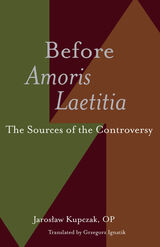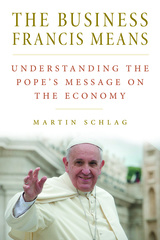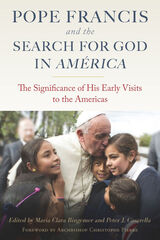

The Business Francis Means aims to break through these walls, showing that Pope Francis has something to say to all Christians. His message, taken as a whole, keeps us from dividing the “seamless garment” of Christ: he reminds the conservatives of the problems of inequality and poverty, and the liberals that social justice is not enough – the Church is the bride of Christ, not a social institution or an NGO.
Monsignor Martin Schlag summarizes and explains the message of Pope Francis on business and the economy in this compact volume. The Business Francis Means will be of great interest to the Catholic layperson, especially one involved in political or economic life.

Moral theologians, defense analysts, conflict scholars, and nuclear experts imagine a world free from nuclear weapons
At a 2017 Vatican conference, Pope Francis condemned nuclear weapons. This volume, issued after the 60th anniversary of the Cuban Missile Crisis, presents essays from moral theologians, defense analysts, conflict transformation scholars, and nuclear arms control experts, with testimonies from witnesses. It is a companion volume to A World Free from Nuclear Weapons: The Vatican Conference on Disarmament (Georgetown University Press, 2020).
Chapters from the perspectives of missile personnel and the military chain of command, industrialists and legislators, and citizen activists show how we might achieve a nuclear-free world. Key to this transition is the important role of public education and the mobilization of lay movements to raise awareness and effect change. This essential collection prepares military professionals, policymakers, everyday citizens, and the pastoral workers who guide them, to make decisions that will lead us to disarmament.

The Latin American Ecocultural Reader is a comprehensive anthology of literary and cultural texts about the natural world. The selections, drawn from throughout the Spanish-speaking countries and Brazil, span from the early colonial period to the present. Editors Jennifer French and Gisela Heffes present work by canonical figures, including José Martí, Bartolomé de las Casas, Rubén Darío, and Alfonsina Storni, in the context of our current state of environmental crisis, prompting new interpretations of their celebrated writings. They also present contemporary work that illuminates the marginalized environmental cultures of women, indigenous, and Afro-Latin American populations. Each selection is introduced with a short essay on the author and the salience of their work; the selections are arranged into eight parts, each of which begins with an introductory essay that speaks to the political, economic, and environmental history of the time and provides interpretative cues for the selections that follow.
The editors also include a general introduction with a concise overview of the field of ecocriticism as it has developed since the 1990s. They argue that various strands of environmental thought—recognizable today as extractivism, eco-feminism, Amerindian ontologies, and so forth—can be traced back through the centuries to the earliest colonial period, when Europeans first described the Americas as an edenic “New World” and appropriated the bodies of enslaved Indians and Africans to exploit its natural bounty.


A call to reform Catholic health care ethics, inspired by the teachings of Pope Francis
Since its first edition in 1948, the US Conference of Catholic Bishops’ Ethical and Religious Directives for Catholic Health Care Services (ERD) has guided Catholic institutions in the provision of health care that reflects both the healing ministry of Jesus and the Church’s understanding of human dignity. However, while the papacy of Pope Francis and the clerical sex-abuse scandal both profoundly impacted the Catholic Church, the latest edition of the ERD does not address or reflect these transformations.
Now for the first time, Todd A. Salzman and Michael G. Lawler present an extended critical commentary on the 2018 ERD. They argue that it is problematic in a number of ways. First, the revised ERD continues to prioritize a rule-based over a personalist-based ethical method, with an emphasis on absolute norms that proscribe specific medical acts. Further, it does not take into account Pope Francis’s transforming ecclesiological, methodological, and anthropological visions, neither internally in Catholic health care institutions nor externally in collaborations between Catholic and non-Catholic health care institutions. Finally, the revised ERD provides no evidence that the bishops grasp how the clerical sex-abuse scandal and its cover-up have fundamentally undermined episcopal authority and credibility.
Salzman and Lawler propose new ways forward for US Catholic health care ethics that prioritize human dignity as their guiding principle. As there is pluralism in Catholic definitions of human dignity, there must be pluralism in the norms and directives that facilitate realizing human dignity. Pope Francis’s emphasis on the virtues of mercy and care should move the ERD forward from a focus on absolute norms in medical ethics to a focus on virtues and principles to guide both patients and health care professionals in their discerned conscientious health care decisions.
READERS
Browse our collection.
PUBLISHERS
See BiblioVault's publisher services.
STUDENT SERVICES
Files for college accessibility offices.
UChicago Accessibility Resources
home | accessibility | search | about | contact us
BiblioVault ® 2001 - 2024
The University of Chicago Press









